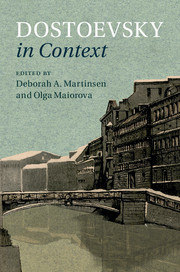Book contents
- Frontmatter
- Contents
- List of illustrations
- Notes on contributors
- Acknowledgments
- Note on citation, transliteration, glossary, and dates
- Chronology
- 1 Introduction: the many worlds of Dostoevsky
- PART I SOCIAL, HISTORICAL, AND CULTURAL CONTEXTS
- PART II LITERATURE, JOURNALISM, AND LANGUAGES
- 25 Modern print culture
- 26 Realism
- 27 Dostoevsky: translator and translated
- 28 Travel and travel writing
- 29 Folklore
- 30 Foreign languages
- 31 Theater
- 32 Dostoevsky's journalism and fiction
- 33 Dostoevsky's journalism in the 1860s
- 34 Dostoevsky's journalism in the 1870s
- 35 Censorship
- Glossary
- Further reading
- Index
- References
28 - Travel and travel writing
from PART II - LITERATURE, JOURNALISM, AND LANGUAGES
Published online by Cambridge University Press: 18 December 2015
- Frontmatter
- Contents
- List of illustrations
- Notes on contributors
- Acknowledgments
- Note on citation, transliteration, glossary, and dates
- Chronology
- 1 Introduction: the many worlds of Dostoevsky
- PART I SOCIAL, HISTORICAL, AND CULTURAL CONTEXTS
- PART II LITERATURE, JOURNALISM, AND LANGUAGES
- 25 Modern print culture
- 26 Realism
- 27 Dostoevsky: translator and translated
- 28 Travel and travel writing
- 29 Folklore
- 30 Foreign languages
- 31 Theater
- 32 Dostoevsky's journalism and fiction
- 33 Dostoevsky's journalism in the 1860s
- 34 Dostoevsky's journalism in the 1870s
- 35 Censorship
- Glossary
- Further reading
- Index
- References
Summary
Western Europe was the leisure travel destination of choice for Russians of means. In the Romantic era, Caucasian spas and the Crimea began attracting domestic vacationers, and by the late 1870s Volga River cruises joined the list. But for Russians keen to expand their cultural horizons, a trip to the West remained an obligatory rite of passage. Dostoevsky fit the pattern. In a letter of July 31, 1861 to the poet Yakov Polonsky, Dostoevsky remarked that while he had yearned to see Italy since childhood, he had landed instead in Semipalatinsk (the remote Siberian town where he was exiled after his imprisonment). In June 1862, Dostoevsky made his first trip abroad. During two and a half months he visited Germany, Austria, Switzerland, France, England, and Italy. However, the travel narrative he produced – Winter Notes on Summer Impressions (1863) – deals primarily with Paris and London constructed as epitomes of all Dostoevsky believed wrong with “the West”: bourgeois materialism, ruthless individualism, and the ills of capitalism. The enduring artistic interest of this tendentious representation lies in Dostoevsky's narrative technique, which anticipates Notes from Underground (1864) and negotiates contributions to Russian travel writing from the eighteenth century into the author's own era.
Winter Notes finds ammunition against Western Europe in many quarters and uses it to advance the native soil* agenda of Vremya (Time), the Dostoevsky brothers’ journal in which the work first appeared. An outstanding antecedent was the eighteenth-century playwright Denis Fonvizin's Letters from France (largely unpublished until the 1830s although they described a trip made in 1777–8). Like Fonvizin, who was reacting to the fashionable Russian Gallomania of his time, Dostoevsky contends that the West is finished, while Russia is arriving. Taking Fonvizin as a starting point, Winter Notes reviews Russia's long history of westernization. Dostoevsky accuses his elite compatriots of subservience to a foreign power and urges them to redirect their attention to the Russian folk to forge a national community. Tourism emerges as an obstacle to this native soil goal. In seeking cultural capital abroad, Russian tourists engage in “servile worship” of the West, a practice that deepens the gulf between the privileged few and the masses – the “fifty million Russians” who stay home (5:51,61; Ch. 2, Ch. 3).
- Type
- Chapter
- Information
- Dostoevsky in Context , pp. 244 - 250Publisher: Cambridge University PressPrint publication year: 2016

